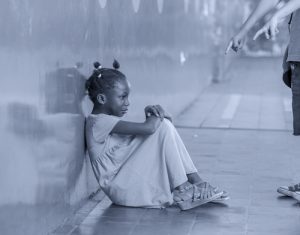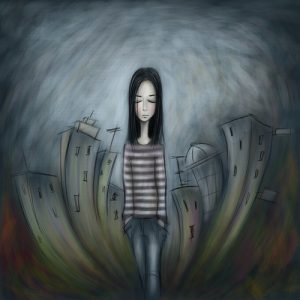Children and their brains are developing things hence the processing of grief is a developing thing and is understood at differently at various stages. When loss occurs, one needs to understand the psychology of a child’s mind. What point of development will dictate the level of understanding of the loss. Hence in the field of child and adolescent grief, one can look at babies, toddlers, adolescents, and teenagers. Each group interprets loss differently. The idea of death also is different from age to age. Some children are not able to comprehend the permanence of death until older.

Many times, parents and adults due to a better lack of understanding of children and how they process grief make poor decisions when loss occurs. Adults and parents will sometimes hide death, or exhibit unhealthy grieving patterns themselves. These types of behaviors can be detrimental to the child’s development. Instead, one needs depending on the child’s age, to properly integrate the child to the experiences of loss and death.
The article, “Grief in Children: How to Help Kids Cope With Loss” by Michele Hirsch takes a closer look at the unique way children grieve. In the article, she points out the various emotions that can sometimes emerge in children. She explains the different ways grief manifests in children and how to pin point it. She also elaborates on how to help children grieve and discuss death at certain ages. Sometimes, children need to speak with someone who is specialized in adolescent and child grief. Overall, she states, children at younger ages have different views on death.
“When it comes to grief in younger children in response to a death, Linda Goldman, a licensed clinical professional counselor with a private grief therapy practice who teaches at Johns Hopkins University in Baltimore and has written many books about grief in children, explains: “It’s marked by causality, reversibility, and egocentricity.” Until about age 7, it is not uncommon for kids to think a death is their fault — and, that the person or pet might come back, she says.”
“Grief in Children: How to Help Kids Cope With Loss”. Michele Hirsch. December 2nd, 2022. Every Day Health
To review the entire article, please click here
Commentary
It is well established that the grieving process for children following a death is distinct from that of adults. This can be attributed to the many differences in cognitive and emotional development between the two age groups, which has an effect on how they respond to loss. Specifically, younger children may have difficulty understanding death as it is abstract, and thus may not feel a deep sense of sadness initially. Conversely, older children may resort to ways of coping such as denial or avoidance in their processing of the situation.

The phenomenon of young children and the reversibility of death is a complex concept which speaks to the complexities of human mortality. The notion suggests that due to the developmental immaturity of young children, they are unable to comprehend the finality and irreversibility of death, instead perceiving it as a temporary absence. This perception can lead to an inability to effectively process and cope with the loss in a mature manner, leading to psychological distress and maladaptive behavior.
Children can learn that death is permanent later as they develop but also through parental guidance. The first time a pet dies, or even a small fish, it is important to address it. Instead of protecting the child from loss and replacing the fish while the child sleeps, it is better to use the death as a lesson for future greater losses.
As children become older, the idea of death as a permanent reality is more concrete and established. It is even more so important to discuss death and loss during this period due to magical thinking. Many children may hold more accountability to the loss to themselves although not their fault. Words or thoughts of anger towards another before death can be held upon with great guilt and a false sense of causality. It is hence important for parents to discuss death and loss at this age.
From children to teens, children can act out in grief. Younger children can revert to bed wetting, teens can rebel, but it is important no matter the age, to stay in contact with one’s child during a loss or grieving period. It is important to understand their different emotional out bursts and emotional behaviors. The manner in which children respond to loss is a phenomenon that has garnered considerable attention from scholars in the field of psychology. Generally speaking, children tend to manifest varying degrees of distress when faced with the reality of loss, ranging from mild sadness to acute symptoms of depression. However, depending on the individual’s cognitive development and level of maturity, their reaction may also be characterized by more adaptive strategies such as seeking social support or distraction through play.
Pre adolescence may show numerous signs of regression or acting out. It is important to reassure younger children that everything is going to be fine and try to keep as close to a schedule as possible. In regards to older children, the idea of death is more permanent and it is more about stabilizing routine but also consoling, talking and discussing the loss. Adolescence is a period of heightened emotional development, which often involves an increased level of sensitivity to the concept of loss. This can be demonstrated through the emergence of various psychological and physical responses to the experience of grief, such as difficulty in concentration and sleep disruption. The adolescent may also experience feelings of helplessness, low self-esteem, depression and guilt, all of which could have significant implications for their social functioning. As the teenage years set in, new challenges can occur. Teenagers may act out, or engage in dangerous social activities. It is hence important for parents to be more active during these following months and not allow isolation to occur.
Conclusion
Due to past misconceptions about children and loss, there has been an attempt to protect children and shield them from death. Not permitting a child to attend a funeral, or displaying poor grieving habits to them can prove to be detrimental to development. Depending on their age and understanding of the concept of death, it is up to parents to help children know everything will be OK and that is not the child’s fault. In addition, it is important to help children understand the nature of death and to let them partake in death rituals to also express themselves. Parents should not be astonished to learn that children will also display grief differently, through play, or intermittent grieving, as well as older children displaying anger or outbursts. Depending on the child’s age will point to understanding and reaction. Parents can play a key role in helping their children learn better grieving habits and help them learn to experience the reality of death in the best healthy way possible.

Please also review AIHCP’s Child and Adolescent Grief Counseling Certification and see if it meets your academic and professional goals. The program is online and independent study and open to qualified professionals seeking a four year additional certification in Child and Adolescent Grief Counseling. The program, however, is only open to those who already have the basic Grief Counseling Certification.
Additional Resources
“How Children Process Grief and How to Help Them”. Nancy Lovering. February 21st, 2022. PsychCentral. Access here
“When Children Grieve” Edy Nathan. March 20th, 2019. Psychology Today. Access here
“Helping Kids Cope With Grief: 6+ Tips to Support Children”. Gabriella Lancia. May 17th, 2021. Positive Psychology. Access here
“15 grief activities for kids from elementary to teens”. Better Place Forests. July 22nd, 2022. Better Place Forests. Access here


